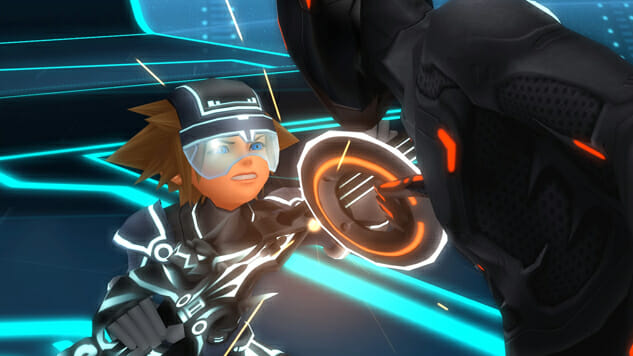All of this is why Kingdom Hearts Dream Drop Distance HD doesn’t fare as well. The dip in control and graphics is huge, but this should be expected as Drop Distance is an HD remake of a 3DS game. On that platform, it looked spectacular, but compared to A Fragmentary Passage it feels extremely dated. Compounding this is that many of the game’s systems were specifically designed for touch screens or brief play sessions. You play as Sora or Riku in the aftermath of Kingdom Hearts II, and every thirty-to-forty minutes, you’re forced to switch characters. Sora and Riku explore the same worlds, the familiar Disney properties of Kingdom Hearts past, but their objectives are often so different it’s hard to remember what you were doing when you’re punted back. If I was playing on 3DS, I’d probably stop after each character swap, but that impulse isn’t the same when I’m sitting on my couch and the game’s blown up on a TV. Drop Distance’s origins as a handheld game are everywhere—from the Pokemon-style companions you must create and raise, to the Space Harrier-esque mini-game begging for simulated 3D, to the Reality Shift attacks which are obviously supposed to use touch-screen controls. The game’s level of difficulty is also wildly unbalanced. Some early bosses are Mega Man hard, while others collapse in less than two minutes.
But, through it all, the combat that has floated Kingdom Hearts since its inception stands out. When you’re striking down nightmares with your Keyblade and not worrying about dropping back to your other character or raising your companions, Drop Distance is an engaging, if absurd, romp through Disney’s B-list properties and Square’s The World Ends with You. It’s just fun, and, unlike so many spinoffs, the story actually sets up the major thrust of Kingdom Hearts III and the final confrontation with series villain Xehanort.
Also included is Kingdom Hearts ? Back Cover, an hour-plus cinematic that fleshes out the timeline of the Kingdom Hearts universe long before Sora, Riku, and Mickey hit the scene. It’s tedious—mostly comprised of overwrought conversations about light and darkness—but its inclusion hints at whether or not this collection is for you. Final Chapter Prologue contains a glorified demo and a remake of a nearly five-year-old 3DS game. It’s an appetizer, and although the story connects to Kingdom Hearts III, it’s obviously not a great place to begin for new fans. They should either wait for March’s Kingdom Hearts 1.5 + 2.5 ReMIX—which collects games more important to the overall narrative—or even Kingdom Hearts III whenever that finally comes out. But, if you’re a longtime fan, this is still a solid entry in the series, and A Fragmentary Passage might be worth the price of admission alone. There are moments throughout when the underlying gameplay and combat exceed the limitations of the collection, and you become totally swept up in eliminating as many goofy enemies as quickly as possible, bouncing off walls, flying through the air, hurling fireballs. For these moments, Final Chapter Prologue is a success.
Kingdom Hearts HD 2.8 Final Chapter Prologue was developed and published by Square Enix. It’s available for the PlayStation 4.
Salvatore Pane is the author of the novel Last Call in the City of Bridges in addition to Mega Man 3 from Boss Fight Books. His writing has appeared in American Short Fiction, Hobart, New South, and many other venues. He teaches English at the University of St. Thomas and can be reached at www.salvatore-pane.com or @salpane.

 Keep scrolling for more great stories.
Keep scrolling for more great stories.

-thumb-688x385-557009.jpg)